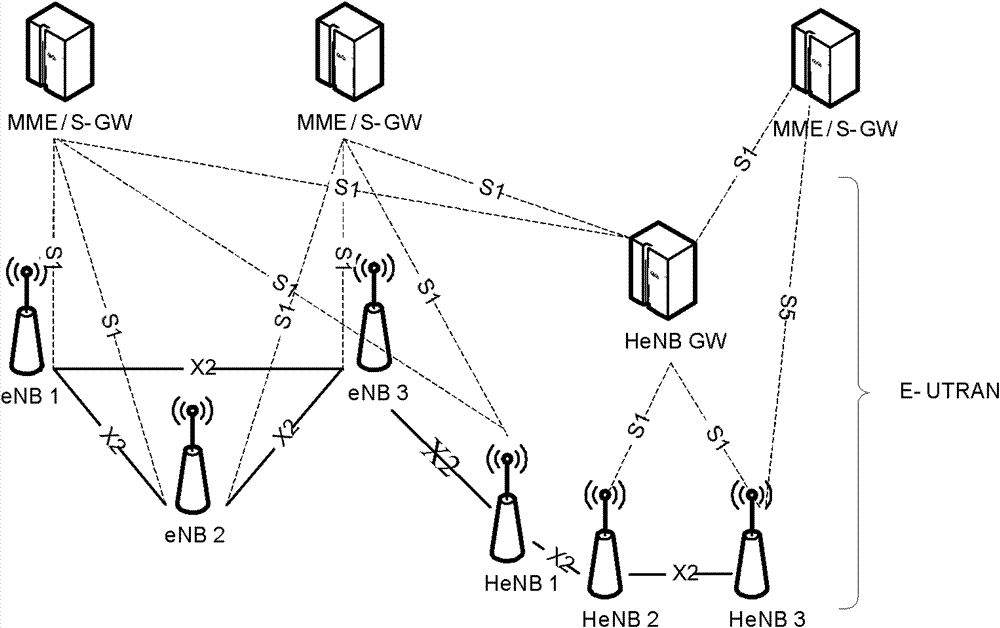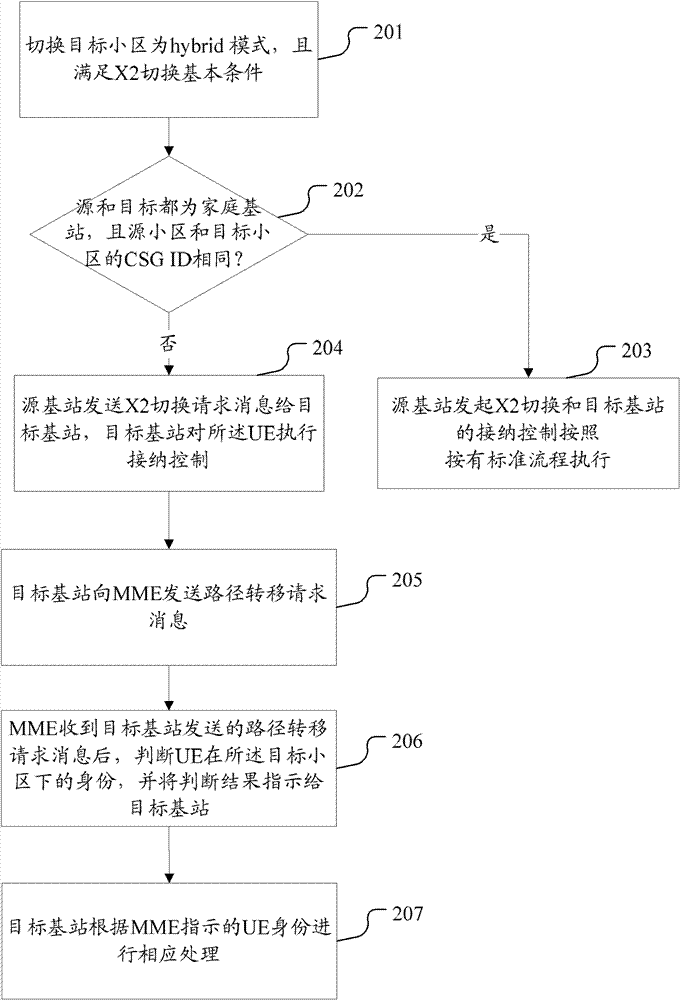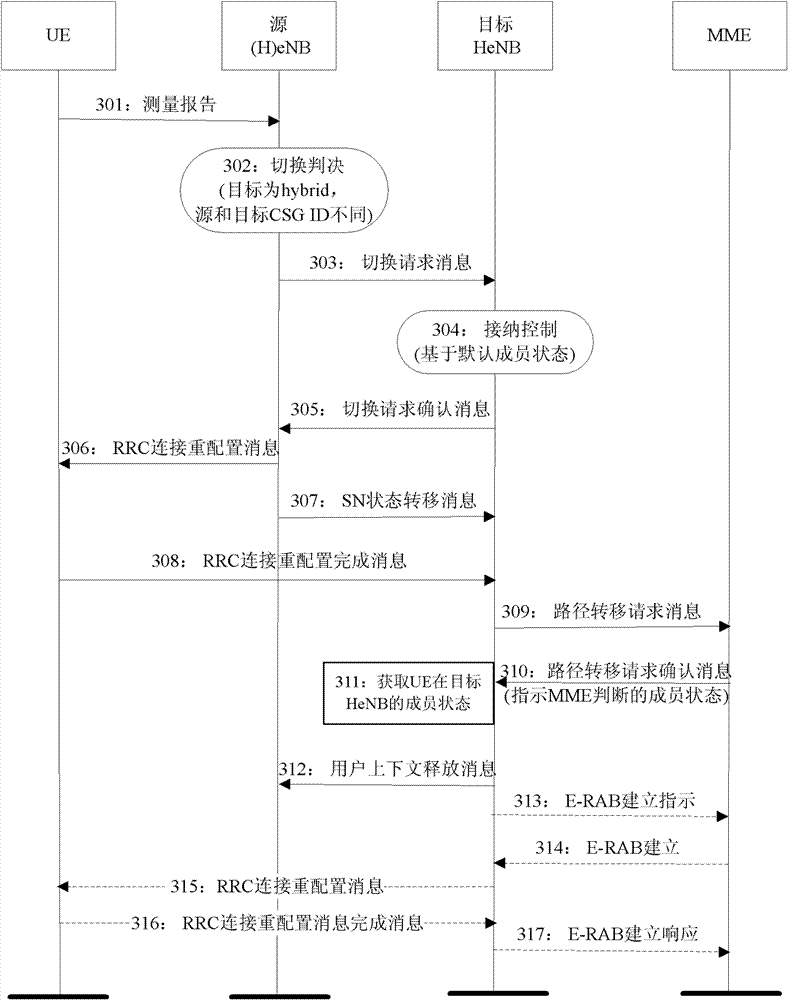A method, system and base station for UE handover to hybrid cell
A cell and base station technology, which is applied in the field of user terminals switching to hybrid cells, which can solve the problems of heavy core network signaling load and large handover delay.
- Summary
- Abstract
- Description
- Claims
- Application Information
AI Technical Summary
Problems solved by technology
Method used
Image
Examples
Embodiment 1
[0133] This embodiment describes a method for the MME to indicate the identity of the UE through a path transfer request confirmation message when the target HeNB performs admission control based on the default identity of the UE. image 3 It is a schematic flow diagram of a method for handing over a UE to a hybrid cell in Embodiment 1 of the present invention, as shown in image 3 As shown, the method includes:
[0134] Step 301: UE sends a measurement report to the source (H)eNB. The measurement report at least includes a Physical Cell ID (PCI) of the target base station.
[0135] Step 302: The source (H)eNB (which may be a macro base station or a home base station) selects a handover target base station according to the measurement report, and can determine the type of the handover target base station according to the PCI.
[0136] Step 303: If the target base station is a hybrid mode home base station and meets the basic conditions for X2 handover (there is an X2 interfa...
Embodiment 2
[0153] This embodiment describes the method for the MME to indicate the UE identity through the UE identity indication message when the target HeNB performs admission control based on the default identity of the UE. The difference between this embodiment and Embodiment 1 is that the MME receives the path transfer request After the message, judge the UE's identity under the hybrid mode target HeNB, and immediately indicate the identity to the target HeNB.
[0154] Figure 4 It is a schematic flow diagram of a method for handing over a UE to a hybrid cell according to Embodiment 2 of the present invention, as shown in Figure 4 As shown, steps 401-409, step 411, and steps 413-418 are the same as steps 301-309, step 311, and steps 312-317 in the flow chart of Embodiment 1, and will not be repeated here.
[0155] Step 410: After receiving the path transfer request message, the MME judges whether the UE is a member or a non-member under the hybrid mode target HeNB according to the...
Embodiment 3
[0159] This embodiment describes that the source base station decides whether to adopt the method described in embodiment 1 or embodiment 2 according to the load condition of the target base station, that is, the usage status of radio resources when making a handover decision. In this way, the access success rate of the membership users can be guaranteed under the condition that the target HeNB is heavily loaded. Figure 5 It is a schematic flow diagram of a method for handing over a UE to a hybrid cell in Embodiment 3 of the present invention, as shown in Figure 5 As shown, the method includes:
[0160] Step 501: After receiving the UE's measurement report, the source base station judges that the target HeNB is in hybrid mode according to the PCI. And there is an X2 interface between the source and target base stations, and the source and target base stations are connected to the same MMEpool.
[0161] Step 502: If the source base station detects that the load of the targe...
PUM
 Login to View More
Login to View More Abstract
Description
Claims
Application Information
 Login to View More
Login to View More - R&D
- Intellectual Property
- Life Sciences
- Materials
- Tech Scout
- Unparalleled Data Quality
- Higher Quality Content
- 60% Fewer Hallucinations
Browse by: Latest US Patents, China's latest patents, Technical Efficacy Thesaurus, Application Domain, Technology Topic, Popular Technical Reports.
© 2025 PatSnap. All rights reserved.Legal|Privacy policy|Modern Slavery Act Transparency Statement|Sitemap|About US| Contact US: help@patsnap.com



